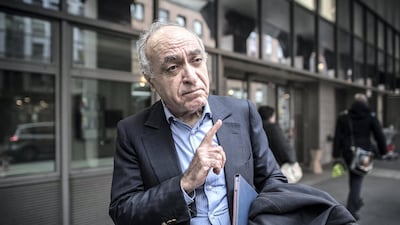Ziad Takieddine, an inscrutable French-Lebanese businessman, has long led a chequered business and private life.
He has now emerged as the man most likely to bring about the downfall of the former French president Nicolas Sarkozy.
A Druze originally from Baakline, 45 kilometres south-east of Beirut, Mr Takieddine finds himself at the centre of an increasingly complex set of threats to Mr Sarkozy's reputation, and perhaps also his liberty.
Running an upmarket ski resort in the Alps brought him into contact with influential political figures. From tending to the sporting and apres-ski comforts of the wealthy and powerful, he turned to the murkier world of arms dealings, acting as a go-between for French defence manufacturers and client states.
Now 67, Mr Takieddine is no stranger to high society, diplomacy and celebrity. His father and an uncle served as Lebanese ambassadors; his niece, the international human rights lawyer Amal Alamuddin, is married to the Hollywood actor George Clooney. He has known fabulous wealth.
But in recent years he has presented himself more as a troubled man craving the truth to be told about some of the shadier negotiations and payments in which he has been involved.
The indictment of Mr Sarkozy, accused of accepting massive illegal financing of his winning 2007 election campaign from Muammar Qaddafi’s Libyan regime, leaves Mr Takieddine, in his own words, with a feeling of “serene” vindication.
French judges’ dogged pursuit of the former president intensified after Mr Takieddine, who had close ties to the Qaddafi leadership, claimed in 2016 that he personally delivered suitcases full of cash in three trips from Tripoli to Paris.
He told the Mediapart investigative website each delivery involved high-denomination notes amounting to between €1.5 million (Dh6.8m) and €2m, the three consignments amounting to €5m.
In total, taking account of allegations from other Libyan sources, Mr Sarkozy’s campaign allegedly accepted €50m from the regime – two-and-a-half times the limit which then applied to presidential election campaigns.
Mr Sarkozy is the latest in a disconcerting series of leading French political figures to face allegations of corruption.
His predecessor, Jacques Chirac, and an ally who served under Mr Chirac as prime minister, Alain Juppe, received suspended jail sentences in a scandal over fictitious jobs for party cronies.
The late socialist president Francois Mitterrand would almost certainly have faced prosecution had he lived long enough to be investigated along with former staff over the unlawful bugging of political enemies on his behalf.
Under French law, Mr Sarkozy’s status, “mise en examen” – placed under formal investigation – is a procedural step that could lead to trial but falls short of being charged with criminal offences. He denies all wrongdoing, claiming to have been targeted because of his prominent role in the coalition that toppled Qaddafi.
_______________
Read more:
Sarkozy: Libyan funding dispute cost me the presidency
Qaddafi regime funded presidential campaigns in US, Ukraine, France
Britain arrests French suspect in Sarkozy financing probe
_______________
But why did Mr Takieddine choose to speak out?
His lawyer, Elise Arfi, admits that in giving his version of events, her client – already indicted in a separate bribery investigation - incriminates himself.
"He wanted the freedom to speak," Ms Arfi told the French newspaper Le Parisien this week. "It must be understood that he is an intermediary and that when he renders services, it is for the benefit of others.
“Ziad Takieddine has endured the juggernaut of justice and he reached the point where he did not want to be alone in taking responsibility for the past.”
Mr Takieddine, who studied at the American University in the Lebanese capital and also at Reading University in England, was married for 30 years to a Briton, Nicola Johnson, whom he met on a skiing holiday. Their divorce seven years ago was a bitter one.
Mr Takiedienne accused her of helping French authorities investigate money-laundering and bribery allegations. She complained of receiving only a modest alimony – €1,000 monthly – despite his estate, including luxury properties in London, Paris and the Cote d’Azur, being worth more than €100m.
One matter in which Mr Takiedinne has subsequently admitted a role was the so-called Karachi affair.
Commissions earned on defence sales to Pakistan and Saudi Arabia in the mid-1990s were not illegal, but some of the money was allegedly diverted to help fund the unsuccessful 1994 presidential bid of Edouard Balladur, for whom Mr Sarkozy was campaign spokesman. Both politicians have vehemently denied involvement.
But after 11 French submarine engineers and four Pakistanis were killed in a Karachi bomb attack in 2002, speculation arose that that officials implicated in the arms deal had carried out revenge for non-payment of fees.
"Who knows Mr Takieddine?" the news magazine L'Express asked in 2011, when life began to turn sour for Mr Takiedinne. "Yesterday, politicians, media bosses and business leaders dined in his Parisian mansion, dipped in his pool at Cap d'Antibes. Today, they turn up their noses."
And there is a further twist to Ziad Takieddine's story.
In a relaxed interview with France Info after news broke of Mr Sarkozy’s indictment, he said the money he delivered was not intended for the presidential campaign after all. It was instead “destined for the interior ministry [Mr Sarkozy was then the minister] in connection with agreements between the two countries on the exchange of services and training".
Whether that explanation carries weight remains to be determined. For now, Mr Takiedinne claims a sense a relief.
Pressed on Mr Sarkozy’s flat denials, he said: “French justice authorities have gone to the limit to put a stop to Mr Sarkozy’s lies … he is the liar.”


